Waiting for the Taliban
Doha -- Around 3.40 each afternoon, Anastasia sits at a piano below a huge chandelier in a Qatar hotel and begins playing.
For the next 90 minutes, the Moroccan-style cavernous lobby echoes to songs including Beyonce's "Halo", Adele's "Hello", "A Whole New World" from Disney's Aladdin and Henry Mancini's "Moon River".
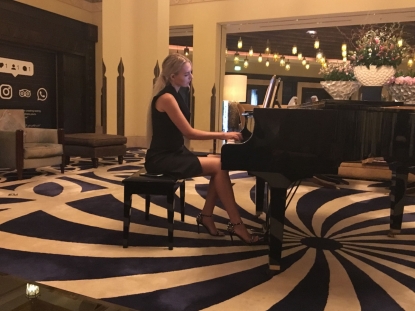 Anastasia. (Photo courtesy of David Harding)
Anastasia. (Photo courtesy of David Harding)So far, so normal.
But for the past two weeks the glamorously-dressed Ukrainian pianist's daily audience has not been the usual assortment of hotel guests, staff and diners.
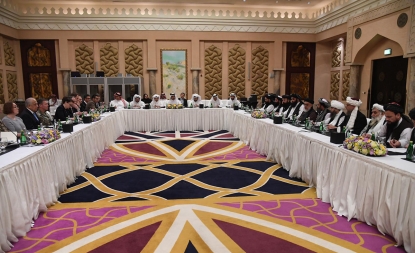 In this handout file photo taken on February 26, 2019 released by the official Qatar's Ministry of Foreign Affairs, Qatari officials (C) take part in meeting between US special envoy Zalmay Khalilzad (2nd-L), the US delegation, Sher Mohammad Abbas Stanikzai (6th-R) and the Taliban delegation, in Doha. US and Taliban negotiators wrapped up their latest round of marathon peace talks on March 12, with "real strides" made but no agreement on a timetable for troop withdrawal, the US special envoy said. (AFP / Stringer)
In this handout file photo taken on February 26, 2019 released by the official Qatar's Ministry of Foreign Affairs, Qatari officials (C) take part in meeting between US special envoy Zalmay Khalilzad (2nd-L), the US delegation, Sher Mohammad Abbas Stanikzai (6th-R) and the Taliban delegation, in Doha. US and Taliban negotiators wrapped up their latest round of marathon peace talks on March 12, with "real strides" made but no agreement on a timetable for troop withdrawal, the US special envoy said. (AFP / Stringer)As the strains of "I can't live, if living is without you" reverberated around the hotel, no more than 20 metres away from Anastasia sat a senior team of negotiators from the Taliban, in the latest stage of peace talks with their American counterparts.
It is unlikely there have been stranger surroundings for such talks -- or a stranger audience for Nilsson's 1971 ballad.
Only a discreet, small partition screen sealing off a slightly gaudily-decorated ballroom close to the rooms where the talks and private discussions took place, gave any clue that something extraordinary was going on so close to Anastasia’s daily repertoire.
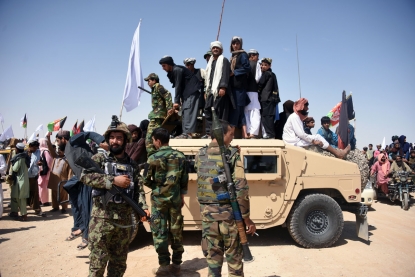 In this photo taken on June 17, 2018, Afghan Taliban militants and residents stand on a armoured Humvee vehicle of the Afghan National Army (ANA) as they celebrate a ceasefire on the third day of Eid in Maiwand district of Kandahar province. (AFP / Javed Tanveer)
In this photo taken on June 17, 2018, Afghan Taliban militants and residents stand on a armoured Humvee vehicle of the Afghan National Army (ANA) as they celebrate a ceasefire on the third day of Eid in Maiwand district of Kandahar province. (AFP / Javed Tanveer)Originally slated to last two days, the Taliban-US talks dragged on for over 16, so the Afghan hardliners who forbid music heard (and they really were able to hear from their nearby negotiating room) the full collection of Anastasia’s performance pieces. Over and over and over again.
The scene got even more bizarre.
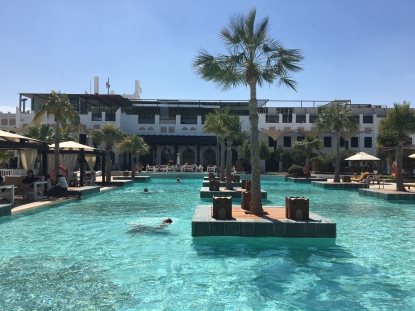 By the pool (Photo courtesy of David Harding)
By the pool (Photo courtesy of David Harding)A short walk from the piano was a large swimming pool, where unsuspecting Western tourists lapped up some winter sun, or drank alcohol at a poolside cafe. Some wandered unknowingly into the lobby in just shorts and a t-shirt.
Just past the pool was a sandy beach, complete with five-a-side football goals, loungers and a Lebanese bar pumping out Ibiza-like music, all with a great view of the Doha skyline.
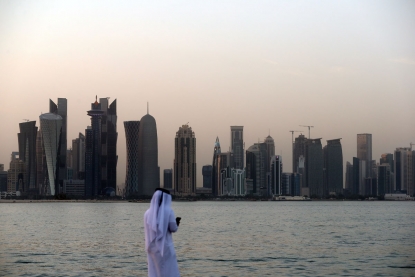 A man looks at his phone on the corniche in the Qatari capital Doha on July 2, 2017. (AFP / Str)
A man looks at his phone on the corniche in the Qatari capital Doha on July 2, 2017. (AFP / Str)Those bored of the beach could visit the hotel spa, where a "Nature Firming Facial", with or without a beard, costs $180, 160 or euros or 13,430 Afghan Afghani.
And this being Qatar, little more than a strong goal kick away from the five-star hotel village entrance, where room prices begin at some $200 a night, the ground was being cleared for one of the 2022 World Cup venues, Ras Abu Aboud.
Unsuspecting tourists passed through the lobby and past the negotiating room without the faintest clue of what is going on.
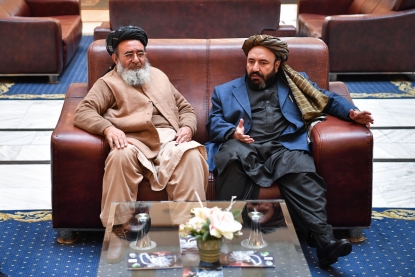 Participants arrive to attend a two-day gathering of the Taliban and Afghan opposition representatives at the President Hotel in Moscow on February 5, 2019. (AFP / Yuri Kadobnov)
Participants arrive to attend a two-day gathering of the Taliban and Afghan opposition representatives at the President Hotel in Moscow on February 5, 2019. (AFP / Yuri Kadobnov)One European visitor approached by AFP laughed out loud in astonishment when told what was happening just a few feet away.
"Really?! You are kidding?"
Would he have stayed here with his young family if he had known?
"Errr, probably not," he says with a bemused smile.
Every now and then a Taliban negotiator would break cover and be spotted walking through the hotel grounds, sporting a traditional Afghan waistcoat and turban.
Or a traditional chitrali cap could be seen bobbing along against a backdrop of palm trees, manicured bushes and holiday villas.
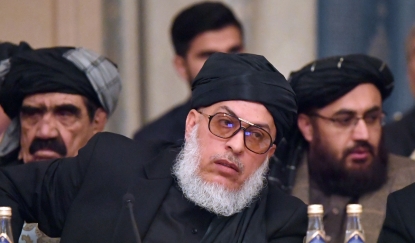 Taliban spokesman Mohammad Abbas Stanikzai attends the opening of the two-day talks of the Taliban and Afghan opposition representatives at the President Hotel in Moscow on February 5, 2019. (AFP / Yuri Kadobnov)
Taliban spokesman Mohammad Abbas Stanikzai attends the opening of the two-day talks of the Taliban and Afghan opposition representatives at the President Hotel in Moscow on February 5, 2019. (AFP / Yuri Kadobnov)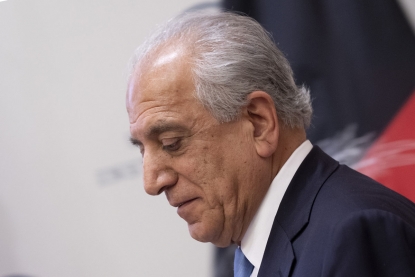 US Special Envoy Zalmay Khalilzad participates in a discussion on The Prospects for Peace in Afghanistan at the United States Institute of Peace (USIP) in Washington, DC, on February 8, 2019US Special Envoy Zalmay Khalilzad participates in a discussion on The Prospects for Peace in Afghanistan at the United States Institute of Peace (USIP) in Washington, DC, on February 8, 2019 (AFP / Jim Watson)
US Special Envoy Zalmay Khalilzad participates in a discussion on The Prospects for Peace in Afghanistan at the United States Institute of Peace (USIP) in Washington, DC, on February 8, 2019US Special Envoy Zalmay Khalilzad participates in a discussion on The Prospects for Peace in Afghanistan at the United States Institute of Peace (USIP) in Washington, DC, on February 8, 2019 (AFP / Jim Watson)
In the morning and evenings, a group of Mullahs could be seen driving a car to and from the ballroom, as several of them live in Doha, including the “Guantanamo Five”, under a deal negotiated between the US and Qatar.
Also spotted at various times were American soldiers in fatigues, walking through the hotel lobby.
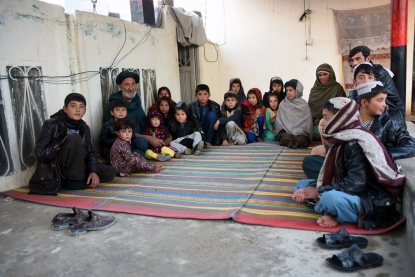 In this photo taken on February 9, 2019, internally displaced Afghans look on in Kandahar city, after fleeing conflict with the Taliban in the Deh Rawood district of Uruzgan province. (AFP / Javed Tanveer)
In this photo taken on February 9, 2019, internally displaced Afghans look on in Kandahar city, after fleeing conflict with the Taliban in the Deh Rawood district of Uruzgan province. (AFP / Javed Tanveer)Despite the surreal surroundings, the high-level talks had a very serious aim, being the latest stage in negotiations to find a way to end the 17-year war in Afghanistan.
On the table were proposals to get foreign armed forces to leave Afghanistan and make the country secure enough so it cannot be used for any future attacks.
Agreement though proved tricky and slow. The talks eventually ended on March 12 with “real strides” made according to the US top negotiator, Zalmay Khalilzad, but no agreement on a timetable for troop withdrawal.
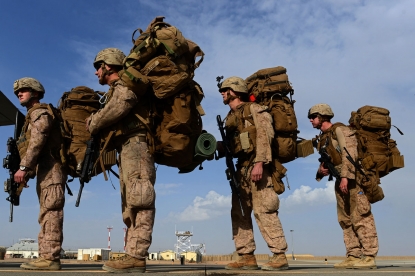 US Marines board a C-130J Super Hercules transport aircraft headed to Kandahar as British and US forces withdraw from the Camp Bastion-Leatherneck complex at Lashkar Gah in Helmand province on October 27, 2014. (AFP / Wakil Kohsar)
US Marines board a C-130J Super Hercules transport aircraft headed to Kandahar as British and US forces withdraw from the Camp Bastion-Leatherneck complex at Lashkar Gah in Helmand province on October 27, 2014. (AFP / Wakil Kohsar)The other group listening daily to Anastasia, in the middle of the lobby, was an increasingly weary team of reporters from a number of local and international organisations, including AFP.
For more than two weeks, we played a bizarre game of cat-and-mouse with Qatari security.
Approaches to Taliban and US soldiers, even a passing diplomat, were met with polite silence.
Every now and then, security would threaten to remove us from the hotel, but then let us stay as long as we assured them we would not do anything deemed too journalist-y.
This included using your phone to try and snatch a picture of the negotiations as one poor soul found out when he was ejected from the hotel -- but at least it was before he had a chance to pay for his lunch.
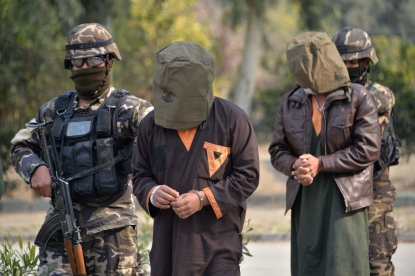 Forces with Afghanistan's National Directorate Security (NDS) escort alleged Taliban fighters after they are presented to media in Jalalabad on January 23, 2019. (AFP / Noorullah Shirzada)
Forces with Afghanistan's National Directorate Security (NDS) escort alleged Taliban fighters after they are presented to media in Jalalabad on January 23, 2019. (AFP / Noorullah Shirzada)Instead, reporters took it in turns to "stretch our legs" during another 10-hour day and go for a relaxed walk past the rooms where talks took place pretending you were just another tourist but desperately trying to snatch a view through dark curtains to see if both sides were still speaking.
We would get excited if a door had been opened or closed – what was this a sign of, what did it mean? Usually nothing.
The talks, some observers delightedly noted, were the longest between the two sides.
But among us journalists, who were subjected to complete silence, there was little joy that we were witnessing a negotiating record being made.
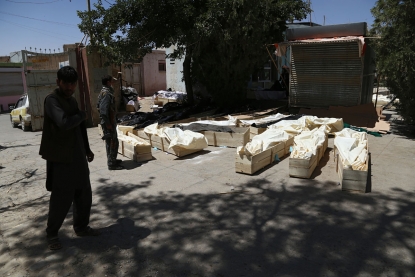 In this photograph taken on August 14, 2018, Afghan residents stand next to coffins containing corpses at a roadside following clashes with Taliban fighters, in Ghazni. (AFP / Zakeria Hashimi)
In this photograph taken on August 14, 2018, Afghan residents stand next to coffins containing corpses at a roadside following clashes with Taliban fighters, in Ghazni. (AFP / Zakeria Hashimi)Every day someone heard a rumour that talks were about to end, and posted it on a WhatsApp group set up by those of us sitting in the lobby. The rumours never proved to be right.
Instead, late at night, some of the American team boarded a minibus and the Taliban jumped into their cars and left without saying a word.
In 20 years of being a journalist, I have never covered an event where everyone said nothing. Nothing at all.
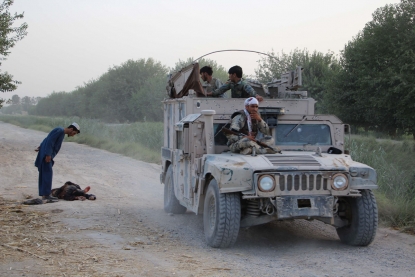 This photo taken on July 17, 2017 shows Afghan security personnel riding in a Humvee as an man (L) inspects the body of a suspected Taliban militant after he was killed during a security operation in the Nawa district of Helmand province. Afghan security forces supported by US air power have retaken the center of volatile Nawa district from the Taliban in southern Helmand province, US officials said on July 17. (AFP / Noor Mohammad)
This photo taken on July 17, 2017 shows Afghan security personnel riding in a Humvee as an man (L) inspects the body of a suspected Taliban militant after he was killed during a security operation in the Nawa district of Helmand province. Afghan security forces supported by US air power have retaken the center of volatile Nawa district from the Taliban in southern Helmand province, US officials said on July 17. (AFP / Noor Mohammad)Instead the rhythm of the day remained the same – afternoon turned into evening, hotel staff would pass through the lobby with an Arabian-style incense burner, and after Anastasia had finished, another glamorously-dressed musician would start playing the violin.
After some 10 hours of waiting, the journalists would slink away as the violin started a medley of Abba hits.
I would pick up my bags and head to the door, accompanied by a string version of “The Winner Takes It All”.
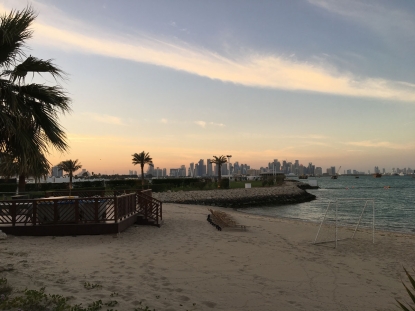 Doha (Photo courtesy of David Harding)
Doha (Photo courtesy of David Harding)


